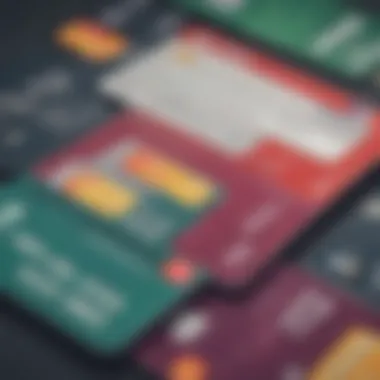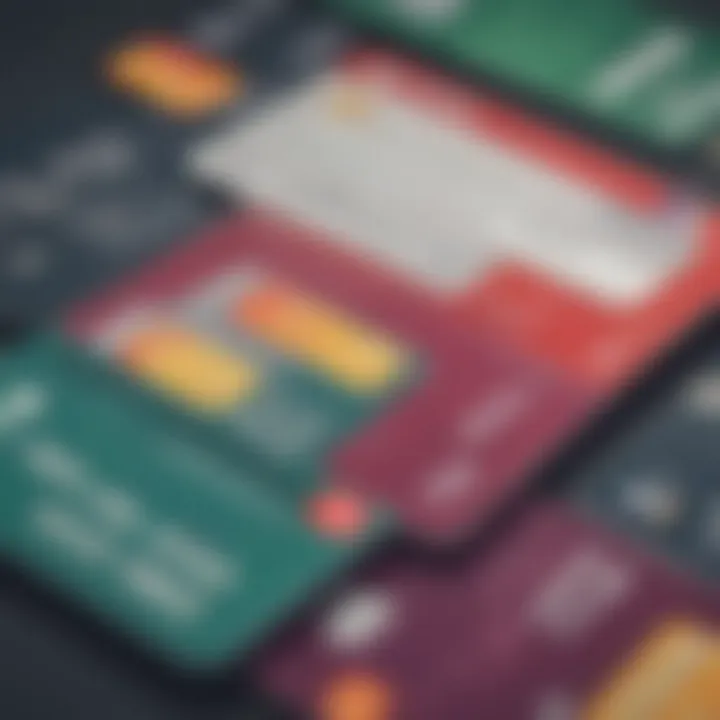Meeting the Urgent Demand for a Debit Card


Intro
In today's fast-paced world, having access to a debit card is often a necessity rather than a luxury. Whether you're trying to grab a bite to eat, pay for public transport, or even make online purchases, the absence of a debit card can throw a wrench in your plans. This brings us to a rather pressing question: how can one navigate the immediate need for a debit card effectively? In this guide, we’ll explore the various aspects, from the types of debit cards available to the application process, all while considering the benefits and drawbacks these financial tools present.
Navigating the process of obtaining a debit card can feel like walking through a maze. The options seem endless and the steps can be overwhelming for someone in true need. Yet understanding where to start and what to consider makes the journey a tad smoother. Each section of this article aims to shed light on these matters, providing insights into managing your finances while using a debit card efficiently.
Getting into the nitty-gritty of this topic, we’ll first establish some foundational knowledge around financial terms related to debit cards and the principles involved in choosing one. Understanding this vocabulary can empower you to make more informed decisions, reducing the chances of common pitfalls.
Additionally, we’ll take a hard look at the various debit card options available today, their application processes, and what each of these choices signifies for your current financial standing. This examination will ultimately lead to a clearer sense of how to approach your immediate need for such a vital financial instrument.
Understanding the Need for a Debit Card
When it comes to managing personal finances, having a debit card can feel like having a safety net. A debit card isn't just a convenient payment method; it embodies a straightforward way to access your bank funds without the complexities of credit. As the tides of modern commerce shift towards a cashless existence, understanding the necessity for a debit card becomes paramount.
A debit card provides immediate access to your money, acting as an extension of your bank account. This enables swift transactions at point-of-sale locations, online shopping, or even withdrawing cash at ATMs. It's that simple: the cash you have in the bank is just a swipe away.
Moreover, a debit card helps you manage your spending. Unlike credit cards, which can tempt one to overspend, debit cards typically limit spending to what you actually have. This, inherently, reduces the risk of falling into debt traps.
In today's financial landscape, being without a debit card can put you at a disadvantage. Paychecks might enter one’s account electronically, bills may need payment instantly, and prices are often more favorable for electronic transactions. Not having such immediate access to your money can feel like fishing without bait—frustrating and counterproductive.
"In this fast-paced world, waiting for cash to come around feels like being stuck in the slow lane. A debit card offers the ability to keep pace with the ever-demanding economic rhythm."
Common Scenarios Necessitating Immediate Access
Several life situations underscore the urgency of needing a debit card. Picture this: you’ve just landed a new job and your paycheck is due. You need to buy work attire, perhaps a suit or simply decent shoes, and your employer expects you to look the part. Or consider a sudden car repair—you need to pay upfront to get your vehicle back on the road. In both cases, tapping into your bank account without a debit card can feel like trying to start a fire without matches.
Here are a few scenarios where having immediate access to a debit card becomes essential:
- Job transitions: With direct deposit becoming the norm, a debit card allows access to funds right away.
- Unexpected Expenses: Emergencies such as medical situations often come with surprise costs, urging the need for immediate cash.
- Travel Needs: In cases of unexpected travel—or missed flights—having a debit card may save you from a stressful predicament when buying last-minute tickets.
The Role of a Debit Card in Daily Transactions
In the daily ebb and flow of life, debit cards play a crucial role in streamlining transactions. They are not just an alternative to cash; they embody a level of convenience that cash can’t replicate. Imagine a Saturday where you decide to hit the local farmer's market. Instead of fumbling through your wallet for coins, you tap your debit card and complete your purchase.
Debit cards also encourage the experience of cashless shopping. This can range from large stores like Walmart to tiny local cafes—many businesses are now geared towards digital payments. Not only does it make transactions quicker, but it can also create a more pleasant shopping atmosphere.
Summary Points on the Role of a Debit Card:
- Ease of Use: Just tap and go—no need to count out cash.
- Security: Losing cash can be a nightmare, but losing a debit card can often be resolved with a quick call to your bank.
- Built-in Budget Control: Since the card draws from your available funds, it promotes better spending habits.
Types of Debit Cards Available
Understanding the array of debit cards available is crucial for anyone needing immediate access to funds. In today’s financial landscape, choosing the right debit card can significantly impact your day-to-day transactions and financial management. Each variety has unique features, fees, and benefits that cater to different needs and preferences. Let’s explore the main types and how they might align with your financial goals.


Standard vs. Prepaid Debit Cards
When the word "debit card" pops into your head, you're probably envisioning a standard debit card issued by a bank. These cards are directly linked to your checking account, allowing money to flow in and out with every transaction. What’s handy about them is that you can only spend what you have; no overdraft, no surprises. This promotes a certain financial responsibility that aligns well with budgeting efforts.
On the other hand, prepaid debit cards might come across as a whimsical alternative. These cards allow you to load funds onto them without linking them to a bank account. They resemble gift cards but serve a broader purpose. An individual can use them to control spending, particularly useful for those on a tight budget or for kids learning about finance.
However, prepaid options often come with fees—think activation fees or monthly charges—which can chip away at your balance. So, carefully weighing your options is vital. It’s all about finding that sweet spot between convenience and cost.
Bank Issued vs. Retail Store Brand Cards
When you walk into a bank for a debit card, you naturally consider what they offer versus cards from retail stores. Bank-issued cards come with more flexibility and generally better fraud protection. Thinking long-term, a bank card often suits online shopping and broad acceptance across merchants better than a retail card, which is usually restricted to one brand or a chain of stores.
Retail store cards, while convenient at the register for your day-to-day shopping, usually come with their own set of caveats. They might offer perks like discounts or rewards, but don’t expect nationwide acceptance like you would with a Visa or Mastercard. Furthermore, make sure to read the fine print, as losing track of your balance can lead to fees that seem to pop up from nowhere.
Virtual Debit Cards: An Overview
In an age defined by digital advancements, virtual debit cards are carving their niche in the market. These cards are not physical; they are often generated through your bank’s app, designed for online transactions. The essence of a virtual card is its ability to enhance security. Because the actual card number isn’t used, it minimizes the risk of theft during online purchases. You can create a temporary number for a transaction and then easily discard it, keeping your primary account details tucked away safely.
Virtual debit cards can be particularly useful for students studying abroad or frequent travelers wanting to control spending without the worry of carrying cash. However, remember that their limitations might include in-store use and some restrictions based on the issuing bank.
In summary, understanding the types of debit cards available can significantly shape how you manage your finances and interact with your money. Take the time to assess various options and their hidden costs to ensure that whatever card you choose aligns with your financial habits.
By navigating through these categories, you’re not just looking for a card; you’re also stepping towards a more organized financial future.
Applying for a Debit Card
When thinking about our financial tools, a debit card is often seen as a linchpin for daily transactions. Obtaining a debit card isn't just a simple errand; it can be a necessary step in managing your finances effectively. Whether you're a student needing a way to handle your allowance or a busy professional juggling numerous responsibilities, understanding the ins and outs of applying for a debit card becomes crucial. The importance of this section revolves around demystifying the process for obtaining a debit card—pinpointing the required documents, evaluating your application options, and clarifying the approval and activation processes.
Documents Required for Application
Before diving into the application process, one should gather the necessary documents. You can't just walk in and ask for a card, as that would be like trying to bake a cake without the ingredients. The typical paperwork may include:
- Identification: A government-issued ID such as a passport or driver’s license.
- Proof of Address: Utility bills, bank statements, or leasing agreements that confirm where you live.
- Social Security Number: Required by most institutions to verify identity.
Having all these items ready can save you a lot of headaches. Missing even one piece might mean a repeat trip or, worse yet, a delay in access to your funds.
Online Applications vs. In-Store Requests
Choosing the right avenue for applying can affect how quickly you get your card. Some prefer the comfort of their home, while others feel more secure navigating these waters in person.
- Online Application: This method tends to be convenient, allowing you to complete the application at your own pace. Many banks have streamlined their online forms, reducing the time needed for completion.
- In-Store Request: Visiting a local branch can sometimes yield more personalized assistance. Being face-to-face with a bank representative might help clarify doubts right then and there.
Moreover, some banks run promotions that are exclusive to online applications, while others offer personalized deals when you walk through their doors. It’s worth exploring both options to determine which suits you better.
Understanding Approval and Activation Processes


Once your application is submitted, understanding the timelines and processes for approval and activation is key. Generally speaking, most banks review applications within a few days, but it can take longer if they need to verify your details further.
After approval comes activation, which can typically be done in several ways:
- Phone Activation: By calling the bank’s dedicated number and following their instructions.
- Online Portal: Many banks provide an online dashboard where you can activate your card.
- In-Branch Activation: Visiting the nearest branch for help.
"The journey from application to activation is not just about waiting; it's crucial to prepare for the next steps to ensure seamless access to your funds."
Taking proactive steps—understanding what's needed, choosing the right application route, and familiarizing yourself with the follow-up processes—will not only ease the path to obtaining a debit card but also lay the groundwork for better financial management in the future. Having that card in your pocket can open doors to a world of possibilities, turning financial plans into tangible actions.
Implications of Using Debit Cards
Understanding the implications of using debit cards is crucial in today’s financial landscape. With the increasing reliance on digital and card-based transactions, it is essential to recognize both the benefits and potential drawbacks associated with these financial tools. Debit cards not only serve as a convenient alternative to cash, but they also come with certain responsibilities and challenges that users must navigate.
Advantages of Debit Card Usage
The advantages of using debit cards are numerous and often attractive, especially for individuals looking to manage their finances effectively. Here are some of the key benefits:
- Convenience: Debit cards allow users to make purchases quickly and easily, both in stores and online. No need to carry cash or worry about finding an ATM.
- Control Over Spending: With a debit card linked to a checking account, individuals can only spend what they have. This immediate connection to their personal finances offers a way to avoid debt accumulation and encourages more disciplined spending.
- Instant Transactions: When a purchase is made with a debit card, the transaction is typically processed instantly. This means that funds are deducted from the user’s account right away, allowing for real-time budgeting and financial management.
- Reduced Fees: Compared to credit cards, debit cards often come with lower or no annual fees. Plus, they minimize the risk of interest charges that can quickly accumulate with credit card usage.
- Availability of Cash: Many debit cards offer the ability to withdraw cash from ATMs, providing users with easy access to their money when needed.
In summary, these advantages make debit cards a popular choice for many, fostering a sense of security and ease in managing finances.
Potential Risks and Disadvantages
Despite their many benefits, debit cards come with risks that shouldn't be ignored. Here are some potential drawbacks:
- Lack of Fraud Protection: While debit cards are generally safe, they often provide less fraud protection compared to credit cards. If someone gains unauthorized access to a debit card, there’s a risk that funds can be drained from the linked bank account before the user is aware.
- Overdraft Fees: If not managed carefully, users may unintentionally spend more than what is available in their accounts. This can lead to overdraft fees, which can accumulate quickly if they occur frequently.
- Limited Reward Programs: Many debit cards offer fewer rewards and perks compared to credit cards. For users who regularly utilize rewards for travel or cashback, this lack of incentives can be a notable disadvantage.
- Perception of Less Prestige: In some scenarios, especially in business contexts, using a debit card might be perceived as less professional compared to credit cards, which could potentially impact certain transactions or experiences.
Managing Finances with a Debit Card
Having a debit card in your wallet can feel like having a financial lifeline at your fingertips. It's likely that, for many, using a debit card isn't just about convenience; it’s about managing money in a way that helps avoid debt while providing easy access to funds. Focusing on how to manage finances with a debit card provides insight into budgeting, expenses, and spending habits.
Managing your finances effectively requires a roadmap. A debit card can serve as your guide. Unlike credit cards, debit cards draw directly from your bank account, urging you to be mindful of your purchases. This immediacy prevents overspending, making it more difficult to lose track of your finances. No more waking up with that sinking feeling regarding your credit card statement.
Budgeting Tips for Debit Card Users
When you’re armed with a debit card, setting a budget is as crucial as ever. Here are some tips to stay on track:
- Allocate Funds: Break your monthly income into categories. Designate amounts for necessities like rent, groceries, and savings. Allocate any remaining funds for entertainment or dining out, but stay disciplined.
- Use Mobile Banking: Many banks offer apps that allow you to monitor your spending in real-time. Use these tools to view your account balance and track your expenses as you swipe your card.
- Set Spending Limits: Some banks offer customizable spending limits. Consider this feature to avoid temptation. For instance, limit yourself to a certain amount for luxuries each month.
- Review Regularly: Make it a habit to review your bank statements at least once a month. This will not only help you stay aware of your spending patterns but also identify areas where you might be overspending.
Tracking Spending: Tools and Techniques
Keeping track of your spending is vital in maintaining financial health, especially when you're using a debit card.


- Budgeting Apps: Use tools like Mint, YNAB (You Need A Budget), or PocketGuard. These apps connect to your bank account, categorize spending, and give you insights on where your money goes.
- Spending Journals: A simple but effective tool is a spending journal. Every time you make a purchase, jot it down. This awareness can change your purchasing behavior.
- Set Alerts: Most banking apps allow you to set alerts for transactions. This feature can help remind you when you’re nearing your set limits, serving as a wake-up call before you overspend.
"An financial strategy that highlights self-discipline can make all the difference in maintaining a healthy budget."
- Balance Tracking: Regularly check your account balance. While it may seem mundane, a constant check can be a deterrent against unnecessary spending.
Alternatives to Immediate Debit Card Access
When in a bind, having fast access to funds is of utmost importance. However, not everyone can get their hands on a debit card right away. This section dives into some alternatives that can serve as lifelines while waiting for a card to be issued. It's crucial to recognize these options, as they can help ease the stress of immediate financial needs.
Temporary Solutions Until a Card is Obtained
While waiting for your new debit card to arrive, you might find yourself scrambling for alternatives. Here are a few practical solutions:
- Cash Withdrawals: If you have a checking account but not a card, see if you can withdraw cash directly from a bank branch. They often can help you out.
- Checks: If you possess checks linked to your bank account, they can function as cash. Just ensure the recipient takes checks.
- Money Orders: These are often available at convenience stores and can be purchased with cash. It's a handy way to ensure funds are available for payments without needing a card.
- Peer-to-Peer Payment Apps: Use services like Venmo, PayPal, or Cash App to have money transferred from someone you trust. This can bridge the gap until your card arrives.
In considering these options, remember not all are created equal. Each has its own fees, limitations, and acceptance rate. So, pick what suits your needs best.
Exploring Mobile Payment Options
Today's digital landscape has opened up numerous avenues for managing finances on the go. If a debit card isn't immediately accessible, mobile payment solutions can be game changers. Here are a few notable ones:
- Apple Pay/Google Pay: If your bank offers compatibility, digital wallets can allow you to make purchases directly from your phone. You can connect your checking account or linked credit cards and pay at places that accept NFC (Near Field Communication).
- QR Code Payments: In some situations, you might be able to pay by scanning a QR code, especially with local merchants who embrace mobile payment.
- Online Banking Apps: Many banks offer apps allowing you to transfer funds or even generate one-time use cards for online purchases. This gives you a sense of security and control over your financial transactions.
Even though these options can be quite beneficial, it’s wise to be cautious. Always ensure that you are using secure networks and that your financial information is protected.
As the financial world continues to evolve, staying informed about alternatives to traditional banking methods ensures that you're never caught off guard.
Every alternative has its pros and cons, thus making it paramount for one to factor in their own situations before diving into any of these options. Having multiple solutions at your disposal can ease uncertainty during a time when things feel a bit rocky.
End
In the contemporary financial landscape, the ability to swiftly procure a debit card can make a significant difference in managing both immediate needs and long-term financial health. The need for a debit card often arises unexpectedly, whether it’s for conducting day-to-day purchases or due to unforeseen circumstances like losing one’s wallet. In situations where cash or alternatives like checks may not suffice, having a debit card in hand provides a lifeline, connecting consumers directly to their bank accounts.
Understanding the different types of debit cards available and their specific functionalities is crucial. While it might be tempting to rush into acquiring the first option available, careful consideration about the card type and issuer can yield better benefits in the long run. Whether it’s a standard debit card linked to a checking account or a prepaid version for controlled spending, the choice reflects one's financial strategy.
Additionally, recognizing the application process, any requirements involved, and the implications of using debit cards can lead to more informed financial decisions. It’s about being well-prepared and ensuring that when the moment arises to make a transaction, there's no hesitation or doubt.
Future Considerations for Debit Card Users
As we progress further into a digital-first world, individuals will need to keep an eye on emerging trends in debit card usage. The introduction of virtual debit cards is one noteworthy trend. These digital alternatives not only provide an extra layer of security against fraud but also simplify online transactions, especially for those wary of entering card details. Furthermore, keeping an eye on cryptocurrencies could set the stage for more innovative financial products in the future, potentially altering the landscape of traditional banking products.
Consumers must also be proactive about understanding fees associated with their debit cards. While many cards nowadays boast being fee-free, hidden charges can sometimes creep in. Regularly reviewing statements can help spot any unusual fees and rectify them before they become problematic.
Final Thoughts on Immediate Needs and Financial Management
In closing, the relationship between immediate access to a debit card and effective financial management cannot be overstated. Those who grasp the nuances of debit card utilization are better positioned to manage their finances and navigate unexpected expenditures with confidence.
It’s also wise to incorporate good financial habits into daily life, such as budgeting and periodically reassessing one’s spending patterns. This will not only create a safety net for emergencies but also promote better long-term financial health.
In the grand spectrum of financial planning, being a savvy debit card user empowers individuals to take control, making informed choices that align with comprehensive financial goals.







